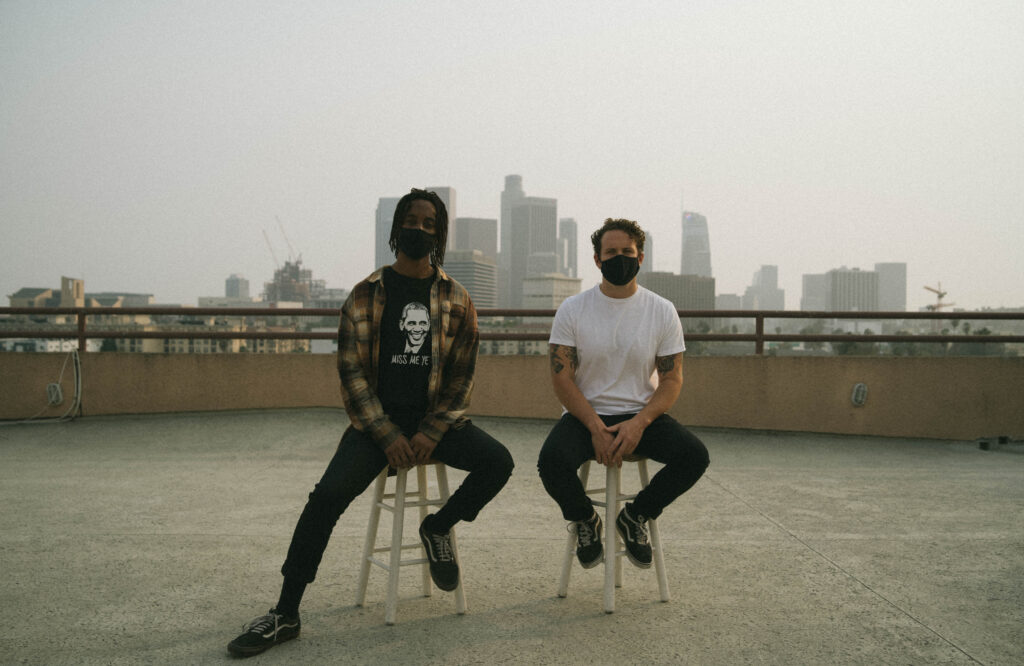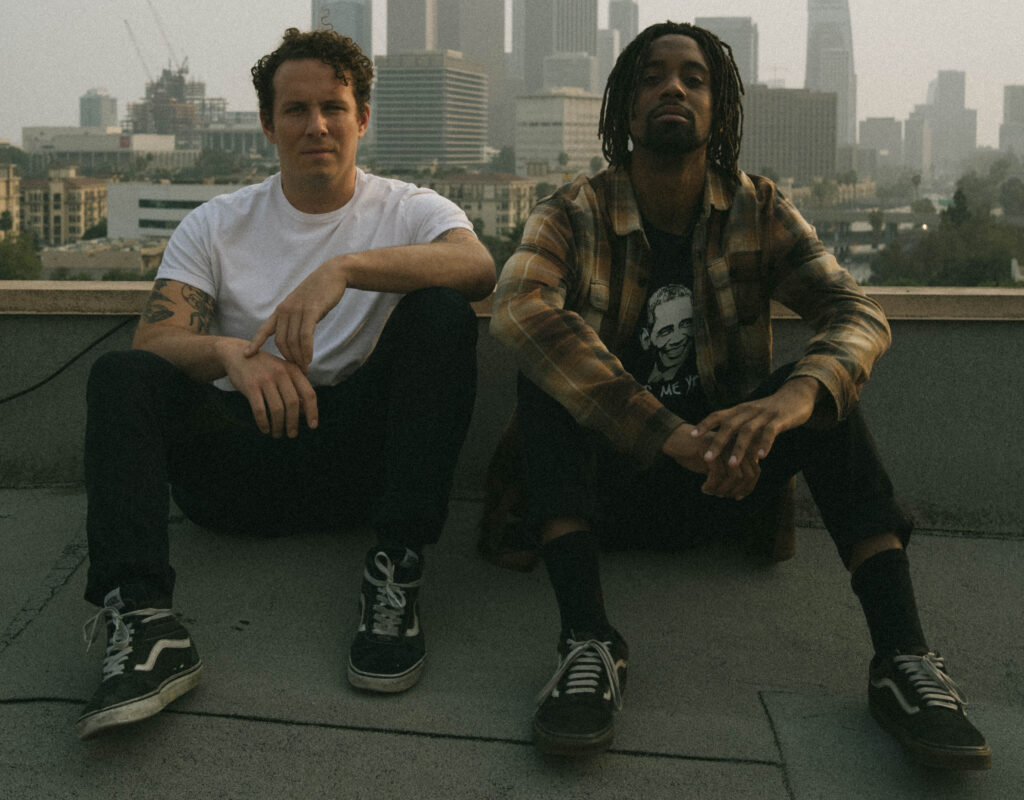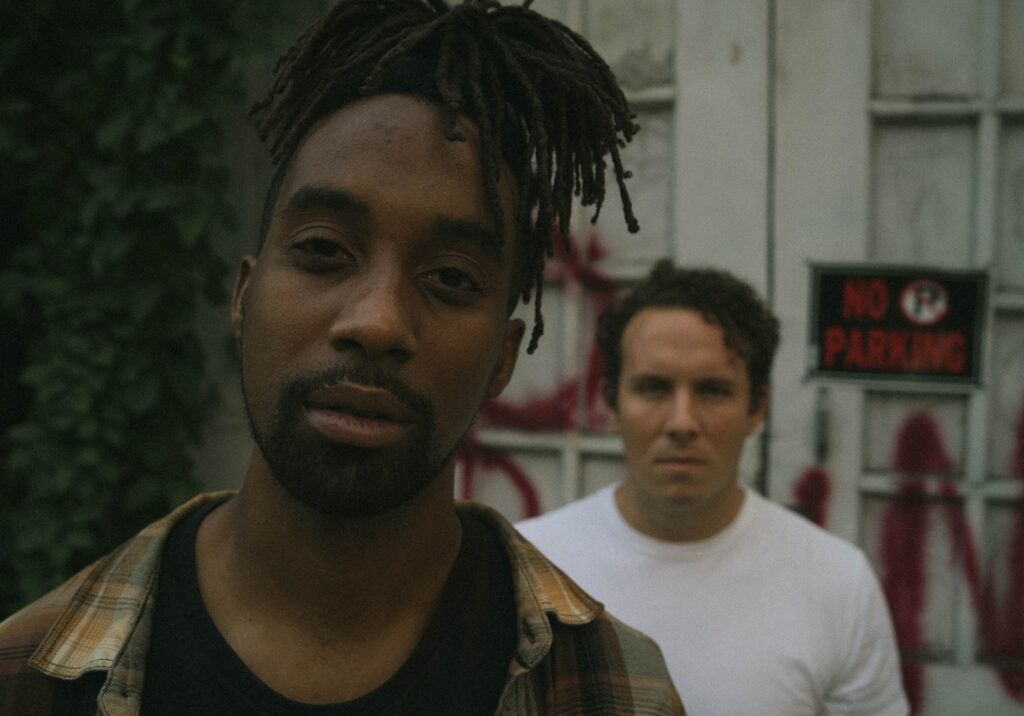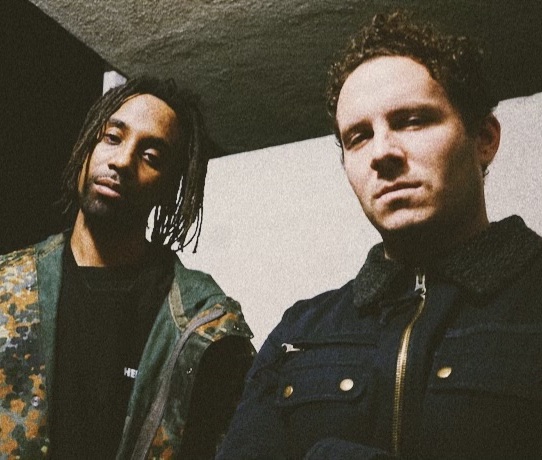Misinformation – Band Interview
Misinformation is a punk band with a strong political viewpoint and a dynamic and raucous sound consisting of Frank Cornish and Tean Baker. The duo felt inspired by the civil unrest and the pandemic to start writing together.
Hailing from Los Angeles, the pair tackles subjects such as police violence economic inequality and the Black Lives Matter movement with fervent energy and a sound that varies from classic punk to alt- rock with a hip hop attitude.
Cornish’s hip hop roots and influences of Dr Dre and Kanye West are evident in his lyrical style and add to Misinformation’s genre-bending appeal.
Described as an artistic lashing out, the band’s debut EP “Where Do We Go From Here?” crackles with rage mixed with desperation at the current state of the world. Nowhere is this more evident than on the first single “Tried” which describes feeling pushed to one’s limits by the trials and tribulations of modern existence.

We sat down with the band to talk about their debut EP, their journey as a band, Trump and what comes next for this exciting and charismatic rock duo.
WFNM: So how did you guys meet?
Cornish: I met Tean while I’m just hanging out Downtown, LA for somebody who is running an independent label. And he was doing some PA work, I linked up with him there.
Baker: Yeah. Frank and I met through a mutual friend who works with a band I used to be in, and Frank just really liked being drunk with me, it was just like that.
Cornish: Yeah. We both turned up for alcohol at the same time, not all the times but sometimes we did.
Baker: Sometimes, yeah.
WFNM: And what inspired you guys to start writing music together?
Baker: I think it was just like, there’s a shit ton of stuff going on, obviously politically and in the country. And then, like, it was probably with the pandemic. Honestly. I remember I stopped working a lot and hit up Frank one time I think for his birthday and was like, “Let’s do a song together. And then we wrote a song in 10 minutes and it was pretty cool.
Cornish: Yeah. I’ve always just wanted to record some alternative, just different records because I come from a hip hop background, but I really respect rock music and I just really wanted to make some alternative, rivalry and also politically. I just felt like I needed to speak my mind, no one’s listening to me if I say it at a party before COVID or they’re not listening to me when I say it on social media. So, I linked up with my boy Tean and I was like, “Let’s make a political song just for the fun of it.” And then it worked out. So we were like, “Let’s just keep doing this.” because it was good vibes.
WFNM: And what about punk, do you think lends itself to being overly political?
Cornish: I don’t think punk lends itself to being overly political because a lot of the people who were in the origins of punk switched up their political views. I think it’s just more of a really accepted, abrasive way to get your views and your thoughts out. But usually… especially when you said the origins of punk, in the regions where it started, those are normally liberal, very politically active areas. But I don’t think punk is necessarily like linked in with politics.

WFNM: Who are your influences as a band?
Baker: I would definitely say, a lot of times musically it’s Nirvana or Stooges or Black Flag. Yeah. Pretty much. When I’m thinking about where the music is, I definitely want to be more like low fi. So, more and more records that are not… nothing like from the computer or like real instruments are definitely more of a low fi sound.
Cornish: Yeah. So, for me, I come from, like I said, a hip hop background, so Dr. Dre, because the way he made his record sound, the clarity of it all, he made it sound like just really cinematic and big. So, Dr. Dre is one of the first artists that influenced me. Kanye West pre his Right Wing Campaign. And that’s just because that guy, he really put hip hop on a pedestal for me and he put it in a class where no one could deny its merit in music. And he also was just a genre bending person and I love genre bending people. And like before the 2017, I think it was, every album sounded different and it was up to a certain quality that was just better than a lot of shit at his time
So Kanye for sure. And then I rather give a big shout out to Radiohead, Thom Yorke and then Jonny Greenwood because those guys, they’re amazing at music, but they actually have soul, and they actually like geniuses and I feel like they’re scientists in a way because they can just make music that sounds just out of here, It’s intergalactic, like a whole different wave. And Beck, he’s just so open-minded to music. He can make any type of record and honestly, that’s what I aspire to be. I aspire to be an artist that can make any type of record that I went to at that time or what I feel.
WFNM: Okay. Can you talk about the name of the band? Where did it come from?
Cornish: Well, we were just trying to come up with a lot of names and I felt like we just called it Misinformation because a lot of the shit that we believe in, especially because he comes from Orange County, I come from a suburban area of the Dallas–Fort Worth metroplex. A lot of our views would be perceived as, Oh, that’s not true. That’s not how it is. You’re giving a twisted version of it. And especially in some of the circles we run because we run with like a lot of, I feel like elitist people in terms of our music crowd, especially pre COVID. And I feel like our views would be perceived as misinformation. So, I was like, fuck it. Motherfuckers always say, I’m saying some different shit than… I guess my shit is misinformation. I was just poking at people.
WFNM: Can you talk about the role you see the media playing in propagating misinformation?
Cornish The media, actual like CNN Media, like MSNBC?
WFNM: Yeah.
Cornish: So that type of media. Yeah, well I feel like-
WFNM: And you can expand that to include social media as well.
Cornish: Yeah. Social media, Twitter and all that. I feel like the media, their job is to get clips. Their job is to get views. So, they’re going to have titles that are, “Oh my God, what is that?” Click baity, whatever you want to call, controversial. But at the end of the day, it’s up to the people to be able to look up the actual information because we live in the internet age, prior when people actually had to go to the library, reading encyclopedia and figure out what’s going on, read newspapers and journals and all type shit was going on, there was somewhat of an excuse for somebody not knowing something. But we live in a time where you have access to the most information ever. So, you can’t necessarily blame the media fully for misinformation. I think the media is just really trying to get views and clicks.
Baker: I think that social media though definitely has given like a voice to people, anybody can seem legitimate. So, anything can seem credible and a lot of people will take it as, as credible. And they can also get it spread to a whole audience of people that will believe it. And I think that the age that we live now, it’s really shitty because credibility has become de-legitimized, anybody can say fake news about anything and actually doing research or having… People that don’t actually do research actually have a bigger voice now. It’s really, really crazy honestly, to me.
WFNM: Okay. Let’s talk about the album a little bit. Can you talk about why you chose to begin the album with the Laura Ingraham clip?
Cornish: We chose that because it was just the epitome of how… I don’t know. I just felt like she was just the epitome of the kind of people I don’t like and it doesn’t matter what your views are when you first hear that clip. It’s awkward. So it just made people feel mad and uncomfortable. I was like, I’m going to make you feel uncomfortable for the stupid ass shit that this lady said. Because really I don’t care if you agree with it or you don’t, it just makes me feel uncomfortable hearing that.
Baker: I think it just opens up… the intro was supposed to be showing the chaotic nature of… when we wrote that, everything was going crazy and you’re hearing so many different things about, I don’t know, the country was just in a shit ton of turmoil and it was supposed to be big it made us sing and then also like juxtapose with all these clips and like shit are people really saying this? I feel like it set the tone.
WFNM: So you talk about economic disparity on “Bootstraps”. Can you expand on that a little bit?
Cornish:Yeah. So, I literally worked a job since I was 16 years old. Everybody’s told me to, save your money, save your money. But I really find it hard to save your money when you’re getting paid maybe two or three dollars more of minimum wage and your bills are way more than that. So if you have a car, now you have insurance, you have rent, you’re a human being that has a life. And you have extra things that you want to do. Maybe you have a passion that you want to put your money into a business. You can’t really do that if you’re working like these jobs where they have you there for 40 plus hours a week, and they’re only paying you like five dollars more than minimum wage. But then after taxes, you’re pretty much back to minimum wage.
And it was me just lashing out against that because I’ve worked for a lot of different people. I’ve worked for Vice. I worked for like we start-ups, I worked for high-end catering companies and I worked my ass off. It feels like I put a lot of my time in my life and my ass sometimes on the line. And I just feel like I don’t get reciprocated, and I feel like this whole entire system needs to change in terms of employees and how you pay them and things of that nature.
WFNM: So talk about “Tried”, you released that as a single and you released a music video for it. Was that the first single you released as a band?
Baker: Yes.
WFNM: Why did you choose that particular song as the first statement that you were making as a band?
Baker: I think that song… That was the first song we ever wrote. And that was just the statement of what the band was. It talks about a lot of different things. Some of the other songs are more nuance with their message, but that one was definitely like right when everything was going on, when we decided to make the band, it’s like, we wrote that in that song I think what we were going to do moving forward.
WFNM: Yeah. What’s the song about?
Cornish: It’s about feeling tried. You never heard the expression, somebody tried your life, like they did something that was negative, that could potentially pull you out of your positive light or pull you out of the mindset that you’re already in, the focus mindset you’re in. I’m just sick and tired of these Republican people getting a lot of these poor white peoples to think that they’re helping them. It’s like, look at the end of the day, these people are literally selling you guys racism, misogyny, and well I guess taking away women’s or reproductive rights in the name of Jesus to… I guess that betters your life economically somehow? I don’t know. I’m just tired of these people doing this. I’m tired of these people, killing black people and not giving a shit. I’m just tired of the federal government. Every single time the conservative is in charge of it not doing what they’re supposed to do and defunding it.
I’m just tired of the hypocrisy. I’m tired of the hypocrisy especially from the right. You got some on the left, but it was just like, like I said, a lot of this album was me just really lashing out in a way that wasn’t going to look crazy. It wasn’t me tweeting a whole bunch or screaming at a bunch of people if I was like at a party or some shit or hanging out with my friends, it was just like… I don’t know, it was an artistic lash out. That’s it. That’s what I was saying. I was angry with the United States government, the current state of it.
WFNM: You talked about police violence on “Dark Daze”. Why was this would an important issue for you to be vocal on?
Cornish: Because United States, wants to act like the police and racism don’t have a hand in hand and it really does. A lot of police departments, especially in the South were created just to go and terrorize black areas. And then you just look at the statistics too, black people were way more likely to get killed by police. And it just keeps happening over and over again. And it’s almost to a point where it’s almost like trauma porn. It was like a new black person gets killed by police every other week. And I just don’t think it’s something that needs to be normalized, especially in 2020.
Cornish: If you go back and look in any history book, any book that talks about America’s past, it’s always a recurring thing of police brutality against the African-American community. So people keep talking about this shit for 400 years, 300 years, whatever you want to say, plus like centuries, then I’m pretty sure that there’s some type of issue here. You just need to stop ignoring this. We can’t talk about, we want to be a progressive and better society, if black people still are getting killed more by the cops and we only make up 13% of the United States, that just doesn’t make sense. We’re like a super minority almost.
WFNM: So would you say that the racial reckoning that came about the summer after the murder of George Floyd really galvanized you guys as a band?
Cornish: I mean the racial… I mean the George Floyd thing for me as a black person, I’m going to let Tean answer his own version but the George Floyd thing for me, it was just the normalization of running a video of somebody getting killed like that. Getting… Somebody put their knee on their neck for that long and they just kept showing it over and over again. But it wasn’t like… I wasn’t surprised by this, this has been going on for forever. Look, we talk about other things that happen to people, but we don’t really acknowledge like the 400 year plus genocide of black people. There’s way worse things have happened before than George Floyd. I just think that George Floyd was white people’s every two decade, wake up call about racism.
WFNM: Okay. So there’s a tonal shift on top of the world and it sounds more like an introspective. Now, can you talk about that a little bit?
Cornish: Well, I just, I don’t know. I just think that, that song was just the most optimistic you can get in the certain situation that we’re in. And I was just saying that regardless of how hard it gets, how tough they want to be on us, how much pressure they want to apply, how many scheming attempts they want to make, we’re still going to keep fighting for justice. We’re still going to keep pushing for progressive views. We’re still going to keep pushing civil rights for people. And just from my perspective as a black man, I’m not free until all black people are free worldwide. So, I think that’s what that song or the last part of that song will stand for. It’s just… I don’t care how tough it gets. This is what I believe in. And I feel like I’m an actual progressive, so, just keep moving.
WFNM: With Biden’s inauguration coming up, do you see the threat of Trump and Trumpism diminishing?
Cornish: No, because I think he really awakened and normalized a certain part of the majority. And I think that people are hurting right now financially, and they’re really looking for someone to blame. And I think Trump does a great job of putting blame on the wrong people or… Yeah, the wrong people. Yeah, I would say the wrong people. He’ll twist the thoughts of people, what somebody did or something like that. But, I don’t know. It just depends on what the Republican party wants to do. If they want to put their big boy pants on and actually tell their constituents the truth to a certain extent that they can, because most of the views are based on bullshit in my opinion then yeah. Maybe Trumpism goes away, but these guys showing that they’re pussies so I think that Trumpism is here to stay.
Baker: I think it may diminish a little bit, but it’s still… I feel like it gained a lot of power, it went through the last election. More people voted for him. It’s like… I think it’s… I don’t think it’s going any time soon.

WFNM: So you guys obviously make protest music, where do you see protest music fitting into the modern musical landscape?
Cornish: We don’t make protest music. We just make music that we want to make. That’s the point of our band. The first project we dropped, it was just because this is the life we live. We dropped some song about, we riding around in the car with a whole bunch of girls and shit, we’re not doing that right now. Bro, I’m literally on unemployment benefits, I’m broke as fuck. I’m trying to… I’m worried about what I’m going to do the next day.
So at the time we made this record, it was a lot of civil unrest going on. It was a whole lot of political posturing going on. Donald Trump was the president, the election was coming up. So that’s what we wanted to write about. But I feel like people should definitely keep an eye on us because we’re in this shit to make music. We’re not in this to just only be political figures or put our ideologies over people’s heads. We just want to put what we feel out there. And that’s why I call it misinformation because it doesn’t even have to be political. It just anything like shit. Our next record is going to be on some mad psychedelic, chill back with your girl, take some shrooms, smoke a joint type shit. So yeah.
Baker: Yeah. That’s kind of interesting of the bit part of the business, it’s not necessarily like the first record I definitely could see how it would be like perceived as obviously like protest music, but once you get out of that we just want to make any kind of music that we’re feeling like at the time, it’s consuming culture, what’s around us and then spitting it back out to people.
WFNM: Okay. So what’s up next for you guys then?
Cornish: Honestly, we’re just going to keep recording singles. Next year, we’re probably going to put out at least two songs a month. We’re going to keep rehearsing. We definitely want to keep rehearsing the, where did we go from here songs, because as soon as it’s socially and medically responsible to be able to go out and perform shows, we’re going to be the first people performing shows because we think that we could bring something new and bring something energetic and fun and potentially introspective. If you, if you give a shit about that type of thing to the table. And honestly just keep doing music. Just because you can’t do shows, just because you can’t really do the full campaigns that you want to do, doesn’t mean that the music stops. So, and I really love music, so we just going to keep writing and we going to keep rehearsing.
Baker: Yeah. We have a lot of songs written and we just finished a song and we’re going to be releasing on Christmas, but we just, we write a lot. We want to put out a lot of music. We don’t really want to like, hold it back or playing it too much. We just want to get a lot of music out there. And then obviously when shows come over we play.
Be sure to check out their latest single “Gills” out now on streaming.

